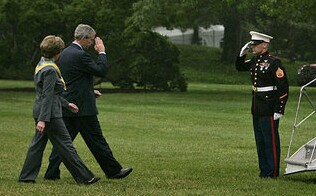Wednesday, February 13, 2008
2009 DOD budget: a safe plan in the president's last year

Posted by John Keller
The U.S. Department of Defense (DOD) has released its budget request for next year, fiscal 2009, and it looks to be a safe budget for President Bush's last year in office. We'll have a new president by the time the next DOD budget request comes out, Bush looks like he has left any hard decisions up to the next chief executive.
There's not a lot that stands out in the DOD's latest budget. Generally it would keep the money faucets turned on at stable levels across the board. Nothing major seems to be cut, and nothing major seems to have a substantial increase.
In other words, steady as she goes. Let the next commander-in-chief make the tough choices.
There could have been big changes, but that wasn't likely in an election year. The Joint Strike Fighter program continues on course, even though some experts point out that this multi-billion-dollar program would make a juicy target for reducing spending.
Other programs that have received close scrutiny and much criticism in recent months -- the Transformational Satellite Communications System (TSAT), the Navy's Littoral Combat Ship, the Joint Tactical Radio System, and ballistic missile defense -- all would receive predictable funding levels in this budget.
Just as this budget request contains few, if any, surprises, I'll bet we'll see more of the same routine on Capitol Hill this spring as Congress discusses whether to grant the Pentagon's proposed spending. It's an election year, after all, and no one wants to be singled out as a big enemy of defense spending.
If big cuts are going to happen, we might see them next year or the year after. For now, it's status quo.
It's shaping up that it doesn't matter if members of Congress are Democrats, Republicans, liberals, or conservatives. No one seems very interested in cutting defense spending in a substantial way. I predicted that the 2008 defense budget would face tough sledding in Congress this past year, but I was wrong. Lawmakers approved the budget essentially as submitted with little fanfare.
I think we'll see the same in coming years. Members of Congress don't want to be seen as anti-military, and the next president won't, either. If the next president is John McCain, he's making the war on terror the centerpiece of his campaign, so spending would seem safe with him.
If the next president is Barack Obama or Hillary Clinton, that person will be under intense pressure to appear tough in international relations. Military spending would appear safe there, too.
I don't think there is a lot to worry about if you're involved in the defense business. Some experts even predict that defense spending could help prop up the economy as the retail and housing sectors soften. We'll see how things unfold.

Posted by John Keller
The U.S. Department of Defense (DOD) has released its budget request for next year, fiscal 2009, and it looks to be a safe budget for President Bush's last year in office. We'll have a new president by the time the next DOD budget request comes out, Bush looks like he has left any hard decisions up to the next chief executive.
There's not a lot that stands out in the DOD's latest budget. Generally it would keep the money faucets turned on at stable levels across the board. Nothing major seems to be cut, and nothing major seems to have a substantial increase.
In other words, steady as she goes. Let the next commander-in-chief make the tough choices.
There could have been big changes, but that wasn't likely in an election year. The Joint Strike Fighter program continues on course, even though some experts point out that this multi-billion-dollar program would make a juicy target for reducing spending.
Other programs that have received close scrutiny and much criticism in recent months -- the Transformational Satellite Communications System (TSAT), the Navy's Littoral Combat Ship, the Joint Tactical Radio System, and ballistic missile defense -- all would receive predictable funding levels in this budget.
Just as this budget request contains few, if any, surprises, I'll bet we'll see more of the same routine on Capitol Hill this spring as Congress discusses whether to grant the Pentagon's proposed spending. It's an election year, after all, and no one wants to be singled out as a big enemy of defense spending.
If big cuts are going to happen, we might see them next year or the year after. For now, it's status quo.
It's shaping up that it doesn't matter if members of Congress are Democrats, Republicans, liberals, or conservatives. No one seems very interested in cutting defense spending in a substantial way. I predicted that the 2008 defense budget would face tough sledding in Congress this past year, but I was wrong. Lawmakers approved the budget essentially as submitted with little fanfare.
I think we'll see the same in coming years. Members of Congress don't want to be seen as anti-military, and the next president won't, either. If the next president is John McCain, he's making the war on terror the centerpiece of his campaign, so spending would seem safe with him.
If the next president is Barack Obama or Hillary Clinton, that person will be under intense pressure to appear tough in international relations. Military spending would appear safe there, too.
I don't think there is a lot to worry about if you're involved in the defense business. Some experts even predict that defense spending could help prop up the economy as the retail and housing sectors soften. We'll see how things unfold.
